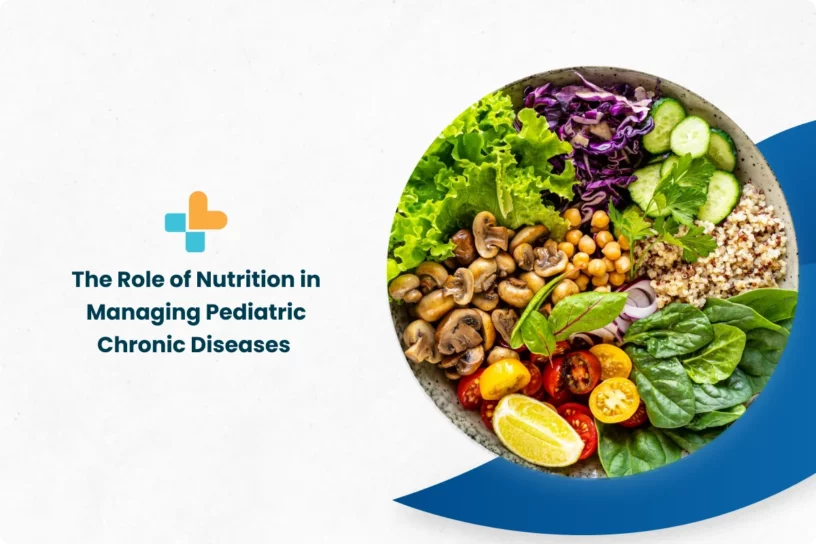Every parent and doctor prioritizes the health of their children. Regrettably, chronic illnesses have grown increasingly common in children, resulting in significant morbidity and death. Obesity, diabetes, and hypertension are just a few of the chronic conditions that have a negative impact on children’s health and well-being.
A recent survey suggests that more than 40% of adolescents and children in the United States suffer from at least one chronic disease (eg. asthma, obesity, etc.). The good news is that diet can help manage and prevent the onset of many disorders.
The role of nutrition in the management of pediatric chronic illnesses, including effective preventive measures and techniques for managing shall be discussed in this blog.

Chronic Disease: Definition and Causes
Chronic diseases are illnesses that grow and worsen over time. Chronic illnesses are the major cause of mortality globally, accounting for 71% of all fatalities, according to the World Health Organization (WHO). Obesity, diabetes, hypertension, and asthma are the most frequent chronic disorders in children.
Some of the commonly observed causes of pediatric chronic diseases are:
- Genetics: Certain chronic disorders, such as cystic fibrosis and sickle cell anemia, are caused by inherited genetic mutations.
- Bad lifestyle behaviors, such as poor diet, lack of physical activity, and prolonged screen time, can contribute to chronic illnesses such as obesity and type 2 diabetes.
- Preterm delivery and low birth weight: Both are risk factors for chronic illnesses such as asthma, heart problems, and type 2 diabetes.
- Exposure to pollution: Environmental contaminants, such as lead, tobacco smoke, and air pollution, can raise the likelihood of acquiring chronic illnesses such as asthma and allergies.
It is crucial to highlight that the etiology of many chronic illnesses is complicated and includes several components. Early identification, prevention, and good care are therefore crucial in achieving better results for kids with chronic disorders.
Prevention of Chronic Disease with Nutrition
Whenever it involves managing chronic illnesses in children, prevention is everything. Proper eating is one of the most effective methods to prevent chronic illnesses. A nutritious and well-balanced diet can help youngsters maintain a healthy weight, strengthen their immune systems, and lower their risk of chronic illnesses.
Children who eat a diet high in fruits, vegetables, wholesome grains, and good proteins have a decreased chance of acquiring chronic illnesses, according to research. Children who eat a diet heavy in processed foods, sugar, and saturated fats, on the other hand, are at a higher risk of acquiring chronic illnesses.
Healthy eating habits may be encouraged by offering good meals and snacks, limiting sugary beverages and snacks, and including children in meal planning and preparation. Furthermore, schools and communities may help to promote good eating habits by providing nutritional alternatives in school meals and encouraging physical exercise.
Management of Chronic Disease with Nutrition
As mentioned above, nutrition plays an integral role in maintaining a person’s health. Hence, the occurrence of pediatric chronic diseases can be prevented or handled with few changes in diet or food intake. Such steps are as follows:
- Consultation with a doctor or qualified dietitian:
A pediatrician or registered dietitian may assist in the development of a tailored nutrition plan based on the child’s health requirements and objectives.
- Offer a well-balanced diet:
A well-balanced diet rich in fruits, vegetables, whole grains, lean meats, and healthy fats can aid in the management of chronic conditions.
- Regulated portion sizes:
Reducing portion sizes is vital in the management of chronic illnesses such as obesity, diabetes, and heart disease. A pediatrician or qualified nutritionist can help with portion control.
- Limit your intake of harmful fats and added sugars:
Excessive consumption of saturated and trans fats, as well as added sweets, might raise your chance of developing chronic illnesses. It is critical to check food labels and avoid items high in saturated fats and added sugars.
- Consume enough water and fluids:
Drinking more than enough water and fluids can help control chronic conditions including kidney disease and diabetes.
- Consider nutritional supplementation:
Some chronic conditions, such as cystic fibrosis or inflammatory bowel disease, may necessitate nutrient supplementation to maintain adequate vitamin and mineral intake.

Lesson Summary
Finally, good nutrition is critical in the management and prevention of pediatric chronic disorders. A nutritious and well-balanced diet can help youngsters keep their weight in check, enhance their immune system, and lower their risk of chronic illnesses. Furthermore, a good diet is critical in the management of chronic disorders in children, lowering symptoms and increasing general health.
Parents, carers, schools, and communities may all help to promote good eating habits and avoid chronic illnesses. Do you have doubts about your child’s health or nutrition? Speak to an expert at Ayu Health for the best medical advice. For more information, contact at 636-610-0800.
Our Hospital Locations
Pediatrics Surgery Hospitals in Chandigarh | Pediatrics Surgery Hospitals in Bangalore | Pediatrics Surgery Hospitals in Jaipur | Pediatrics Surgery Hospitals in NCR | Pediatrics Surgery Hospitals in Hyderabad
Our Doctors
Pediatrics Surgery Doctors in Chandigarh | Pediatrics Surgery Doctors in Bangalore | Pediatrics Surgery Doctors in Jaipur | Pediatrics Surgery Doctors in NCR | Pediatrics Surgery Doctors in Hyderabad
About the Author

Dr. S. Goel
Dr. S. Goel is a renowned Internal Medicine Specialist currently practicing at Ayu Health, Bangalore. He is a Specialist in Internal Medicine, Diabetes HTN, Paediatric Care, and Family Medicine.




